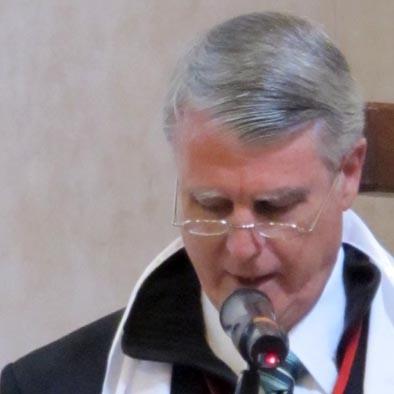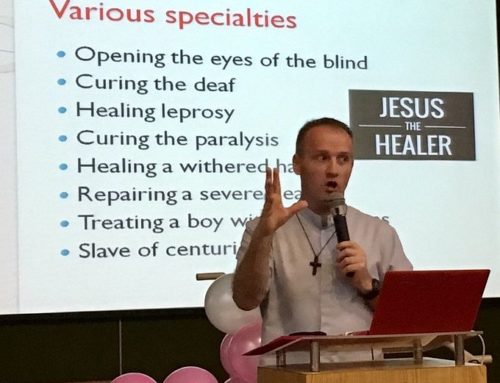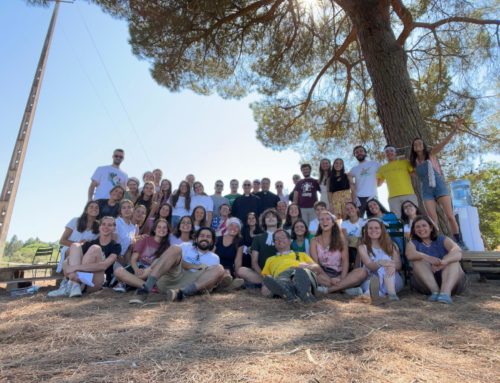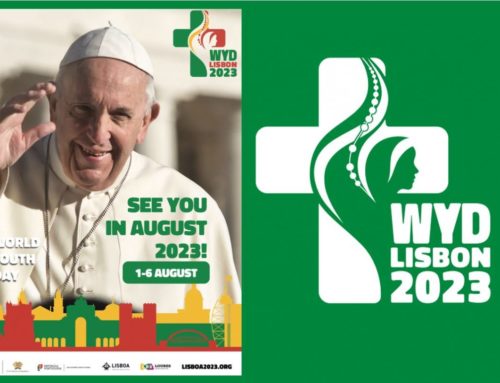Dear Doctor,
I pray that you and your work on behalf of the Catholic Physicians in your local, national and regional associations continue to be blessed by the Holy Spirit.
One of the ancient traditions in medicine is the obligation that physicians have to care for those who are studying to become physicians. It is an expectation likened to a kind of fatherhood that is concerned not just with passing along knowledge of the science of medicine and its art, but of a love and respect for all patients—for all human life. Medicine is not simply a technical understanding of the science of the body but an appreciation for the human person—body, soul and spirit—and all at the same time. Biology is of the utmost importance, but biography is essential. The human body gives shape to a visible person, but the invisible animates and gives life to that body.
The physician is responsible for passing on this kind of understanding of his profession—caring for the whole person—to the medical student. His patients will be not only corporeal persons, but transcendent as well.
“Hold the physician in honor, for he is essential to you, and God it was who established his profession. From God the doctor has his wisdom. His knowledge makes the doctor distinguished, and gives him access to those in authority. God makes the earth yield healing herbs which the prudent man should not neglect; was not the water sweetened by a twig that men might learn his power? He endows men with the knowledge to glory in his mighty works, through which the doctor eases pain and the druggist prepares his medicines; thus God’s creative work continues without cease in its efficacy on the surface of the earth. My son, when you are ill, delay not but pray to God who will heal you; flee wickedness. Let your hands be just, cleanse your heart of every sin. Then give the doctor his place lest he leave; for you need him too. There are times that give him an advantage and he too beseeches God that his diagnosis might be correct and his treatment bring about a cure. “(from Sirach, Hebrew, circa 200 BC)
From antiquity there has been a relationship between the physician, his art, and God. The physician is given an understanding of the wisdom God has made known through His creation. To practice this art without gratitude to God for His gift of allowing man to understand the order of things in creation and how to use it and care for it, is to work impaired. This honest appreciation for the nature of creation and our capacity to understand it is the beginning of humility which opens God’s wisdom to mankind.
When medicine practices its science without reference to God and the grace He provides, a grace which allows men to see the inherent good of each person as a unique creation of God, therefore possessing a right to be respected and a life that obliges the physician to care for its well-being, it falls prey to a relativism of usefulness. Objects are useful or not; the human person is a subject and does not lose his or her worth when they are no longer able to provide a “useful” function in society.
It is crucial, then, that the physician have a real experiential relationship with God—with God who has revealed Himself most fully in Jesus Christ. For this relationship will be the foundation for a faith which will grow as this personal relationship grows through the individual’s prayer and in his or her fidelity to the Church and the Scriptures.
So what does the elder physician have to offer the young physician?
First of all, his or her prayers. He/she should pray for the young doctor, asking the Holy Spirit to pour out His graces on him /her. Secondly, the elder physician has the responsibility to share the wisdom of faith and morals from the teaching of the Church and the appropriation of this body of wisdom by Catholic and Christian medical communities and associations. Lastly, he/she provides the example of their own life expressed in their medical practice.
FIAMC wants to encourage you and your associations to reach out to medical students and young doctors in your area and help them become part of your Catholic Medical associations. This would include, for example:
personal mentoring; helping them organize a Catholic medical student organization as part of your regular association; and, inviting them to your regular conferences.
Identifying doctors in your association who have an interest in caring for students and young doctors and encouraging them to become active in associating with Catholic physicians would be a good step in this direction.
For those associations who already have active student organizations we would appreciate you sharing what you are doing and encourage others to follow your examples.
FIAMC would be glad to keep a list of student organizations that are active and people to contact for information about that organization. This list would be kept by FIAMC’s Rome office. Some student associations already have links and social media sites that are available on the FIAMC website. (For example, the Catholic Medical Student Association USA has links on the FIAMC website.)
We know that what is possible varies from region to region. Catholic doctors and our associations have an obligation to participate in the care and formation of students and young doctors to the extent it is possible. Please pray that the Holy Spirit will show you what He wants you to do.
Plans are being considered for some sessions for medical students and young doctors to be held at next year’s FIAMC conference in Zagreb. One thing a regional or national association could consider would be sponsoring a student to attend this meeting. FIAMC does not have the financial ability to cover student expenses; this would be the obligation of the local association. Although attendance at such an international conference would be very valuable for a medical student, if given a choice between this conference and a local conference, we would encourage the local or national conference for obvious reasons. Each local organization of Catholic doctors would naturally have a responsibility for caring for its own students. We are not trying to form a FIAMC medical student association but to encourage local and regional associations to care for their own students.
We look forward to hearing from you and your contact person.
Sincerely, in Christ Jesus, the Great Physician,
Kevin Murrell, M.D.
Chairman, FIAMC Committee for Medical Students and Young Doctors









